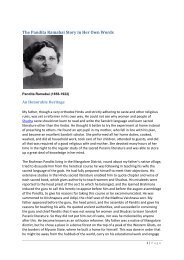Early Church - Heresies - Bible Teaching Program
Early Church - Heresies - Bible Teaching Program
Early Church - Heresies - Bible Teaching Program
Create successful ePaper yourself
Turn your PDF publications into a flip-book with our unique Google optimized e-Paper software.
<strong>Heresies</strong><br />
1. Gnosticism<br />
2. Marcionism<br />
3. Montanism<br />
4. Arianism<br />
5. Nestorianism
Gnosticism<br />
Gnosis meaning knowledge. Secret teaching.<br />
Gnosticism – dualistic (good and evil). Body (evil), spirit (good).<br />
The Gospel of Thomas. Didymus<br />
meaning twin. Teaches Thomas was<br />
the spiritual twin of Jesus.<br />
52 books found in a cave near Nag<br />
Hammadi (Egypt) in December 1945.
Marcionism (c. 85 – c.160)<br />
Marcion’s teaching<br />
God of the Old Testament – evil.<br />
God of the New Testament – good.<br />
Marcionism was Docetic – denying the human nature of Christ.<br />
Compare 1 John 4:1-3<br />
Rejected many scriptures. Made his own canon of scripture.<br />
Accepted Luke’s Gospel and 10 of Paul’s epistles.<br />
Forced church to form a canon of scripture.
Writings against Marcion<br />
Tertullian's 'Against Marcion' (Adversus Marcionem), Book IV<br />
Ephipanius' Panarion sect. 42 'Against the Marcionites’<br />
Irenaeus 'Against <strong>Heresies</strong>'
Montanism<br />
Montanus c.150, came from Ardaban, Phrygia, Asia Minor.<br />
Converted priest of Cybele<br />
Montanism reaction against corruption in the <strong>Church</strong><br />
Call for reform<br />
Restoration of the gifts of the Holy Spirit.<br />
Montanus claimed to have the ministry of a prophet and reformer of<br />
Christianity.<br />
Montanism was characterised by visions and prophecies.<br />
Two women prophetesses, Maximilla and Priscilla.<br />
c.170 church synods pronounced Montanism as heresy.
Montanism – New Jerusalem in Phrygia<br />
Announced the imminent coming of the New Jerusalem<br />
Prophesied that the New Jerusalem would come down from heaven to a small<br />
village, Pepuza, in the west of Phrygia.<br />
Followers led by Montanus to prepare for its coming.<br />
Enforced a strict asceticism including celibacy<br />
Followers left worldly possessions.<br />
Priscilla prophesied:<br />
‘Christ came to me in the likeness of a woman, clad in a bright robe, and He<br />
planted wisdom in me and revealed that this place (Pepuza) is holy, and that here<br />
Jerusalem comes down from heaven.’<br />
When the New Jerusalem did not come the Montanists remained there claiming it<br />
was the residence of the Paraclete (the Holy Spirit).
Opposition to Montanists<br />
Montanus criticised for<br />
• Dissolving marriages<br />
• Enforcing fasting on followers<br />
• Financial misdealings and taking a salary<br />
Priscilla and Maximilla criticised for<br />
• Leaving husbands<br />
• Making financial gain<br />
• Pretended stature of importance<br />
Held prophecy to be on level of scripture.<br />
Accepted marriage but not second marriages.<br />
Paid salaries to clergy and accepted women in ministry.
Examination of Montanist prophecy<br />
Ecstatic utterances<br />
Maximilla prophesied as the passive instrument of the Holy Spirit.<br />
‘I am chased like a wolf from the flock. I am no wolf; I am utterance, spirit, and<br />
power.’ (Quoted by Eusebius)<br />
The gift of prophesy is for exhortation, encouragement and comfort.<br />
The Holy Spirit does not bypass the individual personality of the person<br />
prophesying.
Moderate Montanism<br />
Tertullian became a Montanist c.205.<br />
A less radical form of Montanism spread quickly across Europe.<br />
Montanism sought to bring spiritual gifts back to the church<br />
Montanism was a reaction against:<br />
• worldliness in the church<br />
• clerical hierarchism<br />
Montanism extremism<br />
• Legalistic and<br />
• Exalted celibacy
Alexandrian School<br />
Alexandria was founded by Alexander in 332 BC<br />
Becoming the second most important city of the Roman Empire.<br />
Cosmopolitan city – Greeks and Jews trading.<br />
• The Hebrew scriptures were translated into Greek (Septuagint) in Alexandria.<br />
• Philo linked the Hebrew scriptures with Greek philosophy.<br />
• Schools of philosophical thought.<br />
• Rise of Neo-Platonism<br />
<strong>Church</strong> in Alexandria influenced by Greek philosophy and Hellenistic Judaism.<br />
Development of the allegorical method of interpretation of scripture.
Origen c.185 – 254<br />
Full name - Origenes Adamantius<br />
Pupil of Clement of Alexandria (c.215)<br />
202 Father (Leonides) martyred during the<br />
persecution of Septimius Severus in Alexandria.<br />
Origen wanted to be martyred when his father<br />
was killed but his mother hid his clothes<br />
Christian Neoplatonist<br />
203-215 Head of Catechetical School in<br />
Alexandria.<br />
Castrated himself – to avoid scandal when<br />
teaching women.
Origen c.185 – 254<br />
215-216 Persecution of Caracalla – visited<br />
Palestine invited to preach though only a<br />
layman.<br />
230 Ordained presbyter in Caesarea<br />
231 Bishop of Alexandria angry at ordination<br />
(envious)– Origen moved to Caesarea<br />
250 Imprisoned during Decian persecution.<br />
Tortured sentenced to death.<br />
251 Released after Decian killed.<br />
c.254 Died
Origen’s teaching.<br />
Produced 6000 works.<br />
Works included: Textual criticism; exegesis; theological; and letters.<br />
Textual criticism<br />
Origen’s Hexapla – six versions of the <strong>Bible</strong>.<br />
Origen put them together in six columns.<br />
The six versions were:<br />
8. Hebrew version<br />
9. Greek transliteration (word for word) of the Hebrew version.<br />
10. Greek literal version. Aquila of Sinope’s (2nd century) literal translatin from<br />
the Hebrew.<br />
11. Greek version of the Hebrew scriptures by Symmachus the Ebionite (late 2nd<br />
Century) (paraphrase).<br />
12. Septuagint (3rd-1st century BC)<br />
13. Theodotion’s (c.200) Greek version of the <strong>Bible</strong>.
Origen’s heretical teaching.<br />
Origen’s teaching was declared to be heresy in 553AD.<br />
(Second Council of Constantinople)<br />
There is doubt over what Origen actually taught.<br />
His condemned teaching include:<br />
1. Universal Redemption. Even demons eventually reconciled to God.<br />
2. Hierarchical structure of the Trinity.<br />
3. Preexistence of the soul.
Neo Platonism<br />
Temporality of matter.<br />
Eternal souls perfected by escaping<br />
temporary, imperfect material world.<br />
‘Origen initiating neophytes into the<br />
death and rebirth experience.’
Arianism<br />
Arius was born 256 in Libya<br />
Priest of the church of Baukalis in Alexandria.<br />
Very popular - nearly chosen to be Bishop instead of Alexander.<br />
Bishop Alexander addressed his clergy in 319 re: the Trinity.<br />
Arius publicly attacked what Alexander taught and accused him of<br />
Sabellianism and 'confounding the persons'.<br />
Sabellius claimed that God was one person who manifested Himself in three<br />
ways as Father, Son, and Holy Spirit.
Synod at Alexandria (321)<br />
In 321 a provincial synod at Alexandria was called to discuss Arianism.<br />
Attended by 100 bishops of Egypt and Libya.<br />
At this synod the Arians stated that the Son of God was:<br />
• a created being<br />
• Unequal to the Father<br />
• Capable of sin<br />
The synod excommunicated Arius, two bishops, five priests, and six deacons.<br />
Arius gained the support of Eusebius Bishop of Nicomedia.<br />
Won support at the synod of Nicomedia.<br />
Arius promoted his teaching through writing in defence of his doctrine and<br />
writing songs.
Council of Nicaea (325)<br />
The spread of Arianism caused the Emperor Constantine to call the<br />
Council of Nicaea.<br />
Took place from May - August 325<br />
318 bishops attended + many others, 2000 people altogether.<br />
Most important expression 'Homoousion' - of one substance.
Nicene Creed (325 AD)<br />
'We believe in one God, the Father Almighty, maker of all things<br />
visible and invisible.<br />
And in one Lord Jesus Christ, the Son of God, begotten of the Father,<br />
only begotten - that is, of the substance with the Father; by Whom all<br />
things were made, both in heaven and in earth, Who for us men and<br />
for our salvation came down, and was incarnate, and was made man;<br />
suffered and rose the third day; ascended into the heavens; and will<br />
come again to judge the quick and the dead.<br />
And in the Holy Ghost.'
Athanasius c. 296 – 373<br />
Young presbyter in Alexandria <strong>Church</strong> at time of Nicaean Council in 325.<br />
Recommended as successor by Bishop Alexander<br />
328 AD Bishop of Alexandria and metropolitan of Egypt and Libya.<br />
46 Years as Bishop<br />
Tirelessly defended the doctrine of the trinity against Arianism<br />
Called 'Athanasius contra mundum' (against the world)<br />
Exiled four times from his church by Arian Emperors and Julian the<br />
Apostate.<br />
20 years spent in exile.<br />
Last years spent writing against Arianism.
Athanasian creed<br />
Date of the creed – probably composed after Athanasius death (d. 373).<br />
Not known in the Eastern <strong>Church</strong> until 12th century.<br />
Not authorised by any council of the <strong>Church</strong> but is one of the three<br />
major creeds upheld by Western Christendom.<br />
Apostle's creed (c. 2nd century)<br />
Nicean creed (325)<br />
Athanasian creed (c. 500)
Augustine (350 – 430) He ran back to Alypius and opened "the<br />
Apostle" at Rom. xii. 13, 14, "Not in rioting<br />
and drunkenness, not in chambering and<br />
wantonness, not in strife and envying; but put<br />
ye on the Lord Jesus Christ, and make not<br />
provision for the flesh to fulfil the lusts<br />
thereof."<br />
"No further would I read, nor was it<br />
necessary." The peace of God was in his<br />
heart, and the shadows of doubt melted away.<br />
He marked the passage and told Alypius, the<br />
friends exchanged confidences, and Alypius<br />
applied to himself the words, a little further<br />
on, "Him that is weak in the faith receive"<br />
(Rom. xv. 1).<br />
They went in, and filled the heart of Monica<br />
with joy at the news (Conf. VIII. viii.).
Quote by Augustine<br />
'In essentials unity; in non essentials liberty; in all things charity.'
Nestorius, patriarch of Constantinople (AD 428 – 431)<br />
Brought up in cloister:<br />
Character depicted as narrow, partisan, impatient, and ignorant of human affairs<br />
Nestorianism<br />
The humanity and deity of Christ - two separate and distinct natures<br />
Heresy developed in regard to the word 'Theotokos'<br />
Mary called 'God bearer' or 'Mother of God'.<br />
Nestorius claimed God has no mother rejected this teaching.<br />
Nestorius divided the two natures of Christ so that the Logos indwelt the man<br />
Jesus.<br />
Nestorianism declared heretical at the Council of Ephesus 431.<br />
Nestorian <strong>Church</strong> developed in Assyria and India



